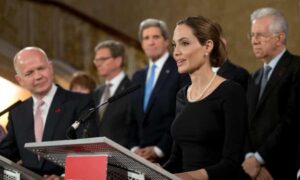
They were minding their own business, scanning the forest for fruit, when the troops approached. Six of them, all holding guns. Victoria Peter, 19, remembers glancing at her five sisters, thinking it might be OK.
It was shortly after 10am on 15 December 2015 – the second anniversary of a vicious civil war that had devastated South Sudan.
Over the next hour, the gunmen raped the young women one by one.
Peter and her sisters were then marched deeper into the dense woodland of Western Equatoria. They arrived at a remote rebel outpost where, for the next six months, they were held as sex slaves.
“They kept at us at an armed camp, there they kept raping us,” Peter says.
Eighteen months earlier world leaders had promised such brutality would never be allowed to happen again. The scourge of conflict-related sexual violence – rape as a weapon of war – would be tackled in places like South Sudan.
The UK government had led the way with such pledges along with declarations of action to eradicate impunity for perpetrators.
Yet in Peter’s homeland things have not panned out as planned. Conflict has returned to swathes of the country; ethnic tensions convulsing a state ranked as the world’s third-most fragile and where rape is used by armed groups to displace, terrorise and subjugate.
Behind the UK-led commitments to end conflict-related sexual violence (CRSV), a Guardian investigation reveals that in reality South Sudan received little funding or support to catalyse change. High-profile perpetrators remain in public office.
Eight years after Peter emerged from her ordeal in the forests of Western Equatoria, CRSV in South Sudan is still not even a specific offence.
